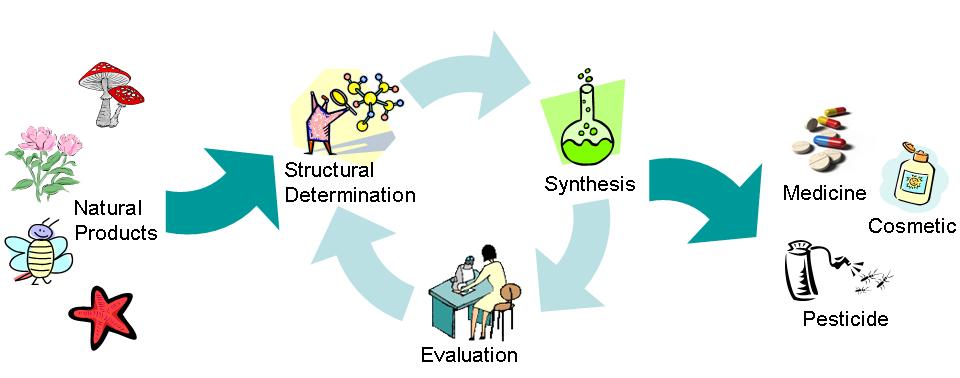

The purpose of our research is to develop new functional molecules that can be used for pharmaceuticals, cosmetics, agricultural chemicals, etc. through structural analysis of natural products created by living organisms, organic synthesis, derivative synthesis, and biological evaluation. The figure above summarizes our research.
When you hear the word pesticide, some may find it dangerous. The key is a balance between activity and toxicity. The more active, the less pesticide used. Some pesticides have less activity but less toxicity.
The history of National Products Chemistry is long dating back to the late 18th century. It is not an exaggeration to say that the field peaked in the middle of the 20th century. Due to the discovery of various antibiotics and hormones, human life has changed drastically, and life expectancy has significantly increased.
Researchers identified novel natural products in fungi, plants, and marine life, some of which have limited practical application at this time. However, it is challenging to predict future needs. Who would have thought that antivirals were needed over 100 years ago?
The need for organic compounds continues to change with the development of surrounding academic disciplines such as biochemistry and molecular biology.
The functional molecules you developed may come into the light after 10, 20 years, or even centuries, although underutilized within the few years of the development. The excitement of the moment when achieving organic synthesis, finding biological activity, and revealing the structure of an organic compound drives reseach on natural products chemistry.
Please contact nihei98ATcc.utsunomiya-u.ac.jp for further details.
Focus on research during the day on weekdays. That is only one rule for our unit. The repetition of reaction, purification, analysis, and evaluation of biological activity create new functional molecules. On weekdays, students in our unit head to the experimental room and proactively conduct the experiments.
Unlike exams, research does not initially have an answer, but there are anticipations of it. This is where you patiently repeat experiments to identify what seems to be an answer. If you find the process to be “fun”, you are suitable for research and development.
Various analytical techniques such as thin-layer chromatography (TLC), high-performance liquid chromatography (HPLC), nuclear magnetic resonance (NMR), and mass spectrometry (MS) are used daily in this unit. Thereby, you can master the procedures of chemical experiments such as synthesis, detection, purification, and structural analysis of organic compounds.
Some may find the NMR to be challenging. If you keep at it for about a year, you will be able to operate the equipment yourself and analyze the spectrum. You will also acquire the fundamental way to handle organic compounds since the experiments use various reagents.
Many students progress to graduate school. Those who graduate from the masters or doctoral program are mainly in the field of research and development. The students who completed our undergraduate and graduate programs works in the cosmetic industry (research, development), pharmaceuticals (research, development, academics, sales), chemical industry (research and development), food products (development), environmental analysis (research), or became government officers.